Related Research Articles

Ghana, officially the Republic of Ghana, is a country in West Africa. It abuts the Gulf of Guinea and the Atlantic Ocean to the south, sharing a border with Ivory Coast in the west, Burkina Faso in the north, and Togo in the east. Ghana covers an area of 239,567 km2 (92,497 sq mi), spanning diverse biomes that range from coastal savannas to tropical rainforests. With over 32 million inhabitants, Ghana is the second-most populous country in West Africa. The capital and largest city is Accra; other significant cities include Kumasi, Tamale, and Sekondi-Takoradi.

Francis Kwame Nkrumah was a Ghanaian politician, political theorist, and revolutionary. He served as Prime Minister of the Gold Coast from 1952 until 1957, when it gained independence from Britain. He was then the first Prime Minister and then the President of Ghana, from 1957 until 1966. An influential advocate of Pan-Africanism, Nkrumah was a founding member of the Organization of African Unity and winner of the Lenin Peace Prize from the Soviet Union in 1962.

The national flag of Ghana consists of a horizontal triband of red, yellow, and green. It was designed in replacement of the British Gold Coast's Blue Ensign.
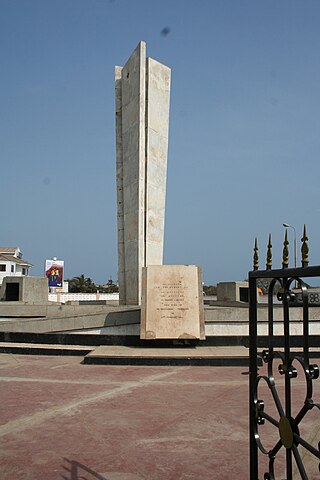
The Accra riots started on 28 February 1948 in Accra, the capital of the then British colony of the Gold Coast. A protest march by unarmed ex-servicemen who were agitating for their benefits as veterans of World War II, who had fought with the Gold Coast Regiment of the Royal West African Frontier Force, was broken up by police, leaving three leaders of the group dead. They were Sergeant Nii Adjetey, Corporal Patrick Attipoe and Private Odartey Lamptey. who has since been memorialized in Accra.
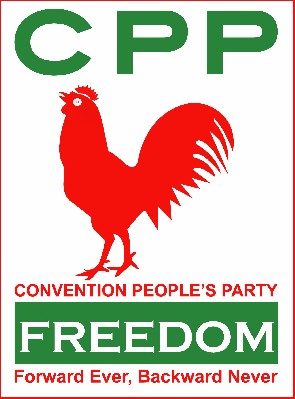
The Convention People's Party (CPP) is a socialist political party in Ghana based on the ideas of the first President of Ghana, Kwame Nkrumah. The CPP was formed in June 1949 after Nkrumah broke away from the United Gold Coast Convention (UGCC).

Kwame Nkrumah University of Science and Technology (KNUST), commonly known as UST, Tech or Kwame Tech, is a public university located in Kumasi, Ashanti region, Ghana. The university focuses on science and technology. It is the second public university established in the country, as well as the largest university in the Ashanti Region of Ghana.

The prime minister of Ghana was the head of government of Ghana from 1957 to 1960 and again from 1969 to 1972.
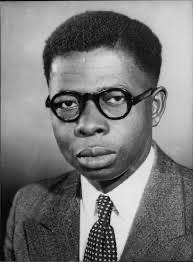
Ako Adjei, was a Ghanaian statesman, politician, lawyer and journalist. He was a member of the United Gold Coast Convention and one of six leaders who were detained during Ghana's struggle for political independence from Britain, a group famously called The Big Six. He has been recognized as a founding father of Ghana for his active participation in the immediate politics of Ghana's pre-independence era. Adjei became a member of parliament as a Convention People's Party candidate in 1954 and held ministerial offices until 1962 when as Minister for Foreign Affairs he was wrongfully detained for the Kulungugu bomb attack.

Dr. Kwame Nkrumah was the first Prime Minister and first President of Ghana. Nkrumah had run governments under the supervision of the British government through Charles Arden-Clarke, the Governor-General. His first government under colonial rule started from 21 March 1952 until independence. His first independent government took office on 6 March 1957. From 1 July 1960, Ghana became a republic and Nkrumah became the first president of Ghana.

Samia Yaba Christina Nkrumah is a Ghanaian politician and former chairperson of the Convention People's Party, making her the first woman to ever head a major political party in Ghana (CPP). In the 2008 parliamentary election, she won the Jomoro constituency seat at her first attempt. She is the daughter of Kwame Nkrumah, first President of Ghana.
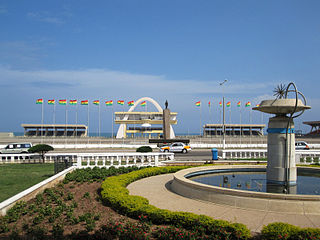
Black Star Square, also known as Independence Square, is a public square in Accra, Ghana, bordered by the Accra Sports Stadium and the Kwame Nkrumah Memorial Park. The square often hosts the annual independence celebrations as well as other national events, and is the site for all civic and military parades and other national gatherings. It was completed in 1961, in time for the state visit of Queen Elizabeth II to Ghana.
Alexander Narh Tettey-Enyo is an educationist and politician. He has been the Member of Parliament for Ada since 2005 and the Ghanaian Minister for Education between 2009 and 2011.

Ghana–Israel relations refers to the bilateral relations between Ghana and Israel. Ghana–Israel relations dates back to the mid-1950s after Israel offered support to develop the Ghanaian armed forces. However, following the 1973 Yom Kippur War, Ghana severed relationships with Israel. In 2011, Ghana and Israel resumed formal relations and opened embassies in the Tel Aviv District city of Ramat Gan and Accra respectively, the Israeli embassy in Nigeria was the only known conduit of engagement between the two countries.
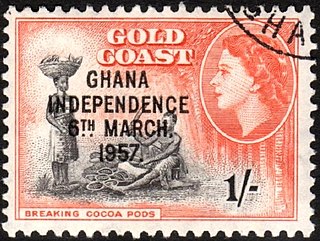
Ghana gained independence from the British on 6 March 1957. It is a member of the Commonwealth of Nations. The country became a republic on July 1, 1960.
1970s in Ghana details events of note that happened in Ghana in the years 1970 to 1979.
1960s in Ghana details events of note that happened in Ghana in the years 1960 to 1969.
Founders' Day is a national public holiday observed to commemorate the contributions of all the people, notably the "Big Six" who led the struggle for Ghana's independence. The Founder's Day was formerly called "Founder's Day" with the letter "S" appearing after an apostrophe and it was celebrated to earmark the achievements of Osagyefo Dr. Kwame Nkrumah.

The Independence Day of Ghana is a national holiday celebrated yearly. This day is an official state holiday for the citizens of Ghana both within and in the diaspora to honour and celebrate the Heroes of Ghana who led the country to attain its independence. The Independence Day is celebrated on March 6 every year. Independence Day is also remembrance of the day that marks the declaration of Ghanaian independence from the British colonial rule. The first Prime Minister of Ghana, Kwame Nkrumah, became the Head of Government from 1957 to 1960. On Wednesday, 6 March 1957 Kwame Nkrumah declared to the people of Ghana about their freedom, he added that, "the African People are capable of managing their own affairs and Ghana our beloved country is free forever." Ghana was the first country in sub-Saharan Africa to achieve its independence from European colonial rule. Many Ghanaians who have had the opportunity to serve as president have remembered the occasion and made Ghana Independence Day a public holiday to celebrate. Granting the day as a national holiday is well recognized such that, if 6 March of a year fell on a weekend of the Independence Day celebration, the working day that follows which is a Monday will be granted and observed as a holiday by the whole nation. Many Presidents from other African countries and Europe have been invited to Ghana to join in the celebration either as Guest Speakers or Invited Guests since the reign of former President Kwame Nkrumah till now.

Theodore Shealtiel Clerk, was an urban planner on the Gold Coast and the first formally trained, professionally certified Ghanaian architect. Attaining a few historic firsts in his lifetime, Theodore Clerk became the chief architect, city planner, designer and developer of Tema which is the metropolis of the Tema Harbour, the largest port in Ghana. The first chief executive officer (CEO) of the Ghanaian parastatal, the Tema Development Corporation as well as a presidential advisor to Ghana's first Head of State, Kwame Nkrumah, T. S. Clerk was a founding member and the first president of the first post-independent, wholly indigenous and self-governing Ghanaian professional body, the Ghana Institute of Architects (GIA), that had its early beginnings in 1963. He was also an Associate of the Royal Institute of British Architects and the Royal Town Planning Institute.

The Political history of Ghana recounts the history of varying political systems that existed in Ghana during pre-colonial times, the colonial era and after independence. Pre-colonial Ghana was made up of several states and ethnic groups whose political system was categorized by 3 main administrative models; Centralized, Non-centralized and Theocratic states. In the colonial era, the British Empire employed different forms of government among its four territorial possessions in the Gold Coast. Indirect rule was implemented in the late 19th century after its success in Northern Nigeria. From the 1940s, native Ghanaians yearned for more autonomy. This resulted in the several constitutional reforms as well as the creation of the office of the Prime Minister in 1952.
References
- ↑ "Ghana country profile". www.news.bbc.co.uk/. Archived from the original on 20 May 2011. Retrieved 18 May 2011.
- ↑ "Ghana profile". www.bbc.co.uk. Archived from the original on 22 June 2011. Retrieved 18 May 2011.
- ↑ Hin, Leo Tan Wee; Subramaniam, R. (24 July 2014). Communicating Science to the Public: Opportunities and Challenges for the Asia-Pacific Region. Springer. p. 190. ISBN 978-94-017-9097-0.